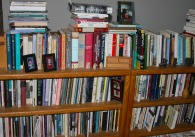I adore random synthesis. I love how coincident information, ideas, and experiences connect to enrich my understanding or pique my interest.
Today, a friend sent me a link to a chapter from the Dalai Lama’s book and another friend sent me to New York Magazine‘s Science of Us blog to read Cody Delistraty’s piece on the neurology of poetry reading. Meanwhile, I have been cleaning my bookshelves and reading Jane Hirshfield’s Ten Windows.
 Delistraty’s essay reports on a study (in Germany) conducted by Eugen Wassiliwizky, a researcher at the Max Planck Institute for Empirical Aesthetics, on what happens in the human brain when people read or hear poetry. The Institute has sponsored quite a few studies on the neurological responses to the arts, which offers researchers not just the findings from one area of aesthetics but the opportunity to compare responses across artistic disciplines.
Delistraty’s essay reports on a study (in Germany) conducted by Eugen Wassiliwizky, a researcher at the Max Planck Institute for Empirical Aesthetics, on what happens in the human brain when people read or hear poetry. The Institute has sponsored quite a few studies on the neurological responses to the arts, which offers researchers not just the findings from one area of aesthetics but the opportunity to compare responses across artistic disciplines.
For example:
…[Neurological] responses… seemed to be unique to poetry: Scans taken during the study showed that listening to the poems activated parts of participants’ brains that, as other studies have shown, are not activated when listening to music or watching films.
The authors also found evidence to support the idea of poetry’s pleasure as a slow-building experience, or what they called a “pre-chill”: While listening to poems they found particularly evocative, the listeners subconsciously anticipated the coming emotional arousal in a way that was neurologically similar to the reward anticipation one might get from, for instance, unwrapping a chocolate bar.
Delistraty notes that in this study, “the poetic lines that most emotionally stirred people were also most memorable for them later.”
Our brains ready themselves for surprise, delight, arousal, some emotional leap in the poem–even before the poem ends–anticipation. I know that feeling well. We are anticipating some kind of surprise or delight as the poem unfolds in our reading or listening real-time imaginations: a kind of freedom that we anticipate but cannot expect (the poem may surprise us in ways we had not anticipated; or it may disappoint our hopes).
Hirshfield writes:
On the one hand…poetic transformation occurs by what might be called the paradox of intimate distance. The freedom inherent in art to choose stance, attitude, approach, form, word, is in itself an act of emancipation. When distance increases…we often feel more, not less, because we are able to take in the whole.
What we “take in” as whole includes the phenomenon of reality, even though the poem operates in the imagination–another paradox. Reading a good poem, then, opens consciousness. 
I realize that in the years keeping this blog, I have never yet found a satisfactory understanding of what makes human beings conscious or from whence consciousness originates; but that’s one reason I keep reading and writing, Socratic gadfly that I am. And that brings me to the third random reading that, to my mind, synthesizes well with the essays I’ve mentioned. Here’s an excerpt from one of the Dalia Lama’s books that was posted on Lion’s Roar, a Buddhist-oriented website. In this chapter, His Holiness has been visiting with neurosurgeons and brain researchers at the cutting edge of medical science–people deeply, empirically engaged with the science of the human mind:
~
The Buddhist understanding of mind is primarily derived from empirical observations grounded in the phenomenology of experience, which includes the contemplative techniques of meditation…
The view that all mental processes are necessarily physical processes is a metaphysical assumption, not a scientific fact. I feel that, in the spirit of scientific inquiry, it is critical that we allow the question to remain open, and not conflate our assumptions with empirical fact…A crucial point about the study of consciousness, as opposed to the study of the physical world, relates to the personal perspective. In examining the physical world, leaving aside the problematic issue of quantum mechanics, we are dealing with phenomena that lend themselves well to the dominant scientific method of the objective, third-person method of inquiry… In the realm of subjective experiences, however, the story is completely different. *
~
Part of what makes poetry, or any art form, “work” is that appeal to the subjective. Subjectivity excludes the empirical; there’s always, somehow, more to art than science can explain–wonderful as science is. Delistraty writes, “poetry transcends…methodical scrutiny. It valorizes the unconscious, opening us up to new perspectives; it implies the possibility of unlimited pleasure.”
Hirshfield names that pleasure, that surprise, that alteration within the reader “hope” –a wonderful synthesis.

~
* The Universe in a Single Atom by His Holiness The Dalai Lama; full discussion on https://www.lionsroar.com/studying-mind-from-the-inside/